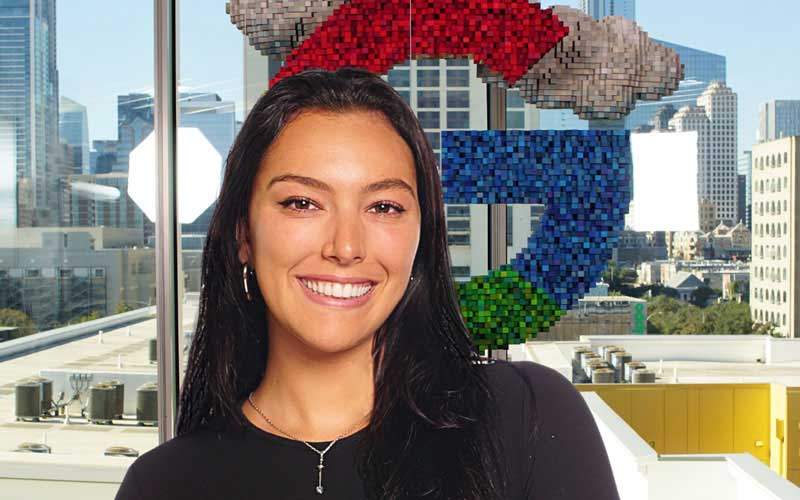Bringing an Entrepreneurial Mindset to Google’s Startup Programs
Farley alum Eden Hirschfield (Medill ’22) reflects on her Northwestern studies in entrepreneurship, journalism, and psychology and how she uses what she learned in her position at Google.

For Eden Hirschfield (Medill ’22), there was nothing more important than crafting a holistic, intensive education for herself while at Northwestern. Hirschfield explored multiple areas of study, eventually landing on a journalism major and minors in psychology and entrepreneurship.
This course of action would help her master communication, interpersonal, and problem-solving skills, all of which she practiced in the classroom and through involvement with multiple organizations.
Now, Hirschfield scales startups at Google. She applies lessons learned from her courses at the Farley Center for Entrepreneurship and Innovation, such as branding, public speaking, and giving and receiving feedback, to help founders grow their ventures using Google products.
In a chat with the Farley Center, Hirschfield considers her time studying entrepreneurship and how she has moved forward with these insights into her professional career.
What motivated you to take classes at Farley?
I always wanted to build something of my own and be my own boss, so the idea of being an entrepreneur was always appealing to me. It came down to looking at the Northwestern course catalog and seeing what interested me and noticing that the Farley classes were very applicable in the real world. There were a lot of projects and cool speakers and immersive activities — I was so over tests and essays — and Farley offered this whole different approach to learning that really resonated with me.
How did you marry your multiple areas of study?
It was about thinking critically, communicating ideas clearly, and building a narrative. Those skills translate really well into entrepreneurship. I felt like there wasn't another major that encompassed all these skills in the way I wanted. I liked the build-your-own approach with entrepreneurship, psychology, and journalism because these skills would equip me well in life no matter what I wanted to do.
With entrepreneurship especially, there are so many skills involved that can help you, even if you don't end up running your own business. Not being afraid to fail, learning how to pitch yourself, and being scrappy — they’re just great life skills.
What does entrepreneurial thinking mean to you?
It's about problem-solving, being adaptable, thinking outside the box, and always looking for ways to improve and innovate. Farley emphasized that in the way that the faculty fosters an environment of feedback. Giving feedback and being OK with getting feedback, that's really important. If you are able to receive feedback, you can grow. That is something Farley taught me.
What skills have you learned in Farley classes that you’ve taken into your professional career?
First and foremost, understanding the mindset of a founder and also being a founder have really helped me now to work with startups, even in a corporate capacity. Being able to relate to them has been really important. Also, being okay with failure and learning how to brand myself have been important.
There was a class I loved called ENTREP: 395 Storytelling for Business where we would get up and tell stories about random things, but it was a good exercise in public speaking and being able to talk to a room. That has helped me so much in what I do now.
How are you involved in entrepreneurship at Google?
I work with early-stage startups. Google has different funding programs and accelerators, and we are always looking to partner with and help early-stage startups. I work with digital-native startups to help them grow using Google products, focusing on Google Cloud specifically.
A lot of them are doing really cool things with AI. I recently had a call with a startup that's creating AI headshots, and I’m working with a different company that's using AI to discover new medication by sequencing molecules. There's just so much potential with AI, and it's so exciting to be working with different startups.
What message would you like to share with current Farley students?
Don’t be afraid to fail. Learning how to fail and being OK with it and moving forward will help you in whatever you do. It’s inevitable that you will mess up, especially in a startup. You will need to improve and not internalize it. That will be the difference between burnout and success.
